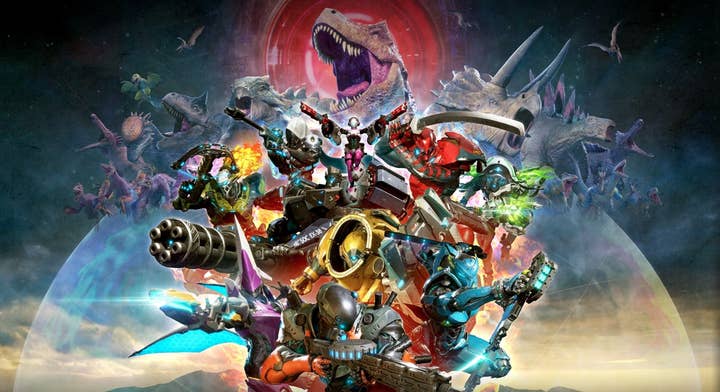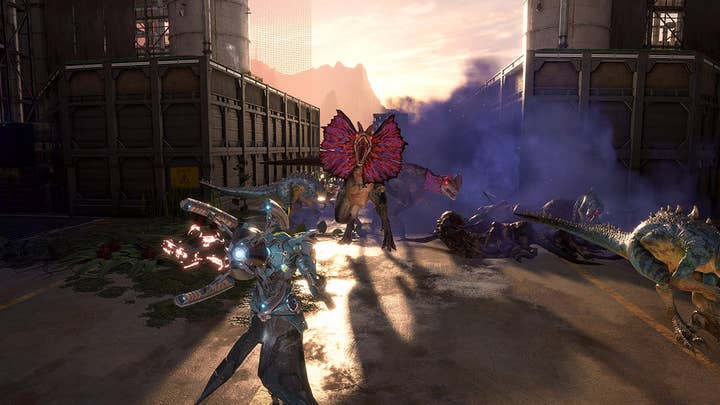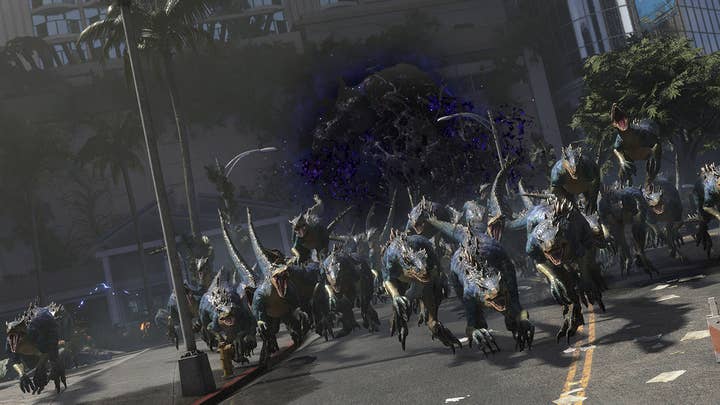Capcom: We could just go wild with Exoprimal
The developer on the freedom of finally working on a new IP
There's something about Exoprimal, Capcom's new live-service dinosaur game, that feels a little old school.
It's camp, over-the-top, stylish and experimental in ways you wouldn't expect. It reminds me of the sort-of games Capcom used to make back in the noughties.
And in many ways, it is. Because Exoprimal is something Capcom doesn't do very often, and that's make a game not in the Resident Evil, Street Fighter or Monster Hunter franchises.
"Capcom has many long-standing IPs, and with those games you do need to consider the background of the previous games whenever you're designing a new one," explains Exoprimal director Takuro Hiraoka, who had previously worked on Monster Hunter gamers.
"We were entirely free with this game to start from scratch, and think about all the stuff we want to put in it… so what we're into, and the aspects we want to play around. For example, having futuristic exosuits facing off against prehistoric dinosaurs... that represents the interests of the dev team, and the kind of things we thought were cool. We wanted to put those things together with a fun over-the-top story where these things are happening. That creativity reflects the fact we could go wild with whatever we wanted to do with the game."

Capcom's reticence around new IP is understandable. The AAA games space is an expensive world to inhabit, and the company just isn't on the same scale as many of its competitors. It appears to have prudently decided it's better to be No.1 in a comparatively niche genre like horror than it is to be No.12 in action shooters.
Even when it does try to branch out with VR projects or live-service games, it typically does so within the confines of an IP like Resident Evil or Monster Hunter. So what made Capcom agree to the creation of Exoprimal?
"Whenever we look to get a game greenlit, one of the main things we need to achieve is convincing the business it is a stand-out concept," begins technical director Kazuki Abe. "And that applies to making games based on existing IPs, as well as new IPs. We also have to tell them it's going to be worth taking on this new challenge.
"In this instance, the game design we had in mind was going to require a lot of technical development and resources, a lot of research on how to implement such a massive number of enemies on screen at the same time, and taking on this idea of mixed PVP and PVE action. These are all things we hadn't really done before. But we managed to convince them that we had the drive to make these things work, and to take on the challenge of technically achieving them and making them happen. And not only that, we said it was going to be worth it and there will be value in doing this."
"Whenever we look to get a game green lit, we need to convince the business it is a stand-out concept"
Kazuki Abe, Capcom
Abe adds that working on Capcom's first new IP in a while did come with a lot of freedom, but there was pressure, too. "If I had to divide it up, I'd say it was 80% freedom and 20% pressure when creating a new IP." So did the game come with extra scrutiny from Capcom leadership?
"I don't feel the process was massively different just because we were doing a new IP," Abe adds. "We have our standard procedures and pipelines in place. Like with any other game, we had the usual progress elements in play, like creating milestones, doing internal checks on progress… this being a new IP didn't change that."
The inclusion of dinosaurs may make Capcom fans think of the Dino Crisis series, which received its last game almost exactly 20 years ago. But the development team says that Exoprimal was more influenced by the company's Monster Hunter and Street Fighter games.
"I've worked on Monster Hunter games in the past, and that's up to four players taking on usually one, sometimes a couple, of large monsters at a time," says Hiraoka.
"The structure of the teams in Monster Hunter are not predefined, but there are an elements of roles in terms of what weapons you choose will determine how your team performs against the monster. I took that experience into Exoprimal when it came to deciding how to divide up the roles of the exosuits. We considered which ability went on to which suit and how would that allow players to create different team propositions... that's what my experience on Monster Hunter really helped with."
Art director Takuro Fuse added: "I did work on many fighting games in the past, and that was useful in the sense of designing the action to have a certain satisfaction to it. In a fighting game, when you hit another player that needs to feel impactful, and I wanted to translate that into Exoprimal as well. Also the characters are very strong in things like fighting games, where they all stand out and have different abilities. When we were designing the different characters and suits that you play in this game, I wanted to make sure it had that almost fighting game roster feel, where they're all unique with different abilities but they also complement each other."

Hiraoka also has experience working on live-service titles through the Monster Hunter Frontier series, which were online multiplayer versions of the Monster Hunter franchise that were released in Asia. So he is familiar with the need to take on feedback, watch what players are doing and speak with them often.
"It's important to gain the trust of players with that kind of communication," he says. "That is a skill that I hope to put to use now that we have launched.
"Even this soon after launch, the way you expected people to play the game, or experience things, pre-launch is slightly different in reality. So we are already taking on some feedback and also some data, and we've decided on certain adjustments that we might make in the future, which I can't get into at this time."
The game's launch has had a mixed reaction so far. Some critics have praised the game for being unique and fun, while others feel the execution is a little messy. But it's early days, and its real success will be decided over years, not weeks. Due to Game Pass, the title has already seen over one million players, so there is plenty of data and insight for the team to build on.
"At the moment we are very much focused on seeing how that's going, checking on how the players are playing the game, looking at their feedback and thinking about the next steps," Abe concludes. "There is a roadmap we've publicised already, but at the moment we just want to see how people are responding to the game and keeping the player base happy."

